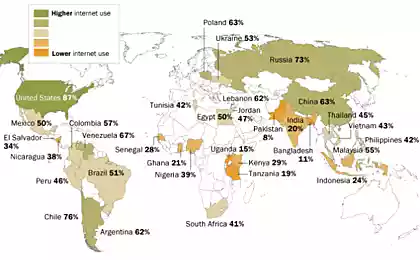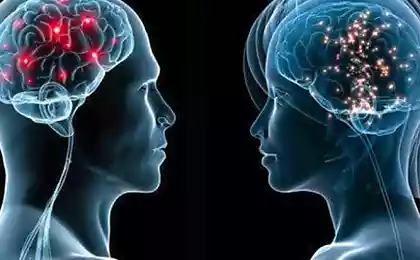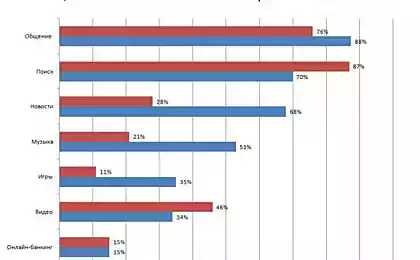589
Active Internet users are much more stupid than they seem
Google has created a whole generation of people who are not as smart as they think, researchers warn. The site says that it alerted sociologists and psychologists. "The Internet - is an incredibly powerful medium where you can enter in the search box of any request and where you have access to the knowledge of the world - said the lead investigator, Matthew Fisher of Yale University - in result can be very easy to confuse their own knowledge with the data from an external source ».

In a series of experiments, the results of which were published by the American Psychological Association, the subjects to search for information on the network, sincerely believed that they are more aware than in the control group, not related to the search.
The results surprised the researchers: test were highly inflated sense of awareness, even in cases where they find the information in the network or have no effect. In addition, after searching the network subjects thought that their brain works much more active than that of the control group.
The experiment was 9, the number of participants varied from 152 to 302, all of them were recruited through the Internet, in each experiment, participants were different.
In one experiment, the team used Internet search to answer the four questions (for example, "how the zipper?") And to provide a link to a site with the best answer. A control group was given only the text of the most exhaustive answers to the four questions copied from the best sites.
Then there was the test the ability of both groups to answer questions not related to the search on the Internet (for example, "why cloudy nights warmer»?).
In all cases, the representatives of the online group considered themselves more aware. Even if they could not get to the right information because Google filter or due to the high complexity of the issues (for example, "why the story of the ancient Cushites was more peaceful than the Greek? "), it had no effect on their self-esteem.

"Cognitive effects of" stay in the search mode "can be so strong that people feel more intelligent, even when not managed to find the net that they need," - said study co-author Frank Keil, professor of psychology at Yale University. < br />
In another experiment, the subjects were engaged in the search, thought that their brain works more actively when compared with the control group when they were shown pictures of the results of tomography of the brain, "his", they have always believed that the image on which the different areas of the brain "light" most intensively .
"In the course of research people should actively read books or seek the help of experts, instead of looking for information online. Then, if you do not know the answer to any question, it will be quite obvious to you, and to find the answer, you will need to make some effort. With the advent of the Internet line between what you know and what you think you know, has become very blurred, "- said Fisher.
"The widespread use of smart phones can seriously aggravate the problem, since the internet search is always on hand, and the negative effect will manifest itself all the stronger as the children are not producing smart phones out of the hands from an early age will grow," < / - says Cale.
via www.dailymail.co.uk/sciencetech/article-3020507/How-Google-makes-feel-smarter-Researchers-say-confuse-knowledge-search-engine.html

In a series of experiments, the results of which were published by the American Psychological Association, the subjects to search for information on the network, sincerely believed that they are more aware than in the control group, not related to the search.
The results surprised the researchers: test were highly inflated sense of awareness, even in cases where they find the information in the network or have no effect. In addition, after searching the network subjects thought that their brain works much more active than that of the control group.
The experiment was 9, the number of participants varied from 152 to 302, all of them were recruited through the Internet, in each experiment, participants were different.
In one experiment, the team used Internet search to answer the four questions (for example, "how the zipper?") And to provide a link to a site with the best answer. A control group was given only the text of the most exhaustive answers to the four questions copied from the best sites.
Then there was the test the ability of both groups to answer questions not related to the search on the Internet (for example, "why cloudy nights warmer»?).
In all cases, the representatives of the online group considered themselves more aware. Even if they could not get to the right information because Google filter or due to the high complexity of the issues (for example, "why the story of the ancient Cushites was more peaceful than the Greek? "), it had no effect on their self-esteem.

"Cognitive effects of" stay in the search mode "can be so strong that people feel more intelligent, even when not managed to find the net that they need," - said study co-author Frank Keil, professor of psychology at Yale University. < br />
In another experiment, the subjects were engaged in the search, thought that their brain works more actively when compared with the control group when they were shown pictures of the results of tomography of the brain, "his", they have always believed that the image on which the different areas of the brain "light" most intensively .
"In the course of research people should actively read books or seek the help of experts, instead of looking for information online. Then, if you do not know the answer to any question, it will be quite obvious to you, and to find the answer, you will need to make some effort. With the advent of the Internet line between what you know and what you think you know, has become very blurred, "- said Fisher.
"The widespread use of smart phones can seriously aggravate the problem, since the internet search is always on hand, and the negative effect will manifest itself all the stronger as the children are not producing smart phones out of the hands from an early age will grow," < / - says Cale.
via www.dailymail.co.uk/sciencetech/article-3020507/How-Google-makes-feel-smarter-Researchers-say-confuse-knowledge-search-engine.html
8 facts about cars, created to order a single copy
Three Amazing stories about how life was Soviet-Indigo Children























